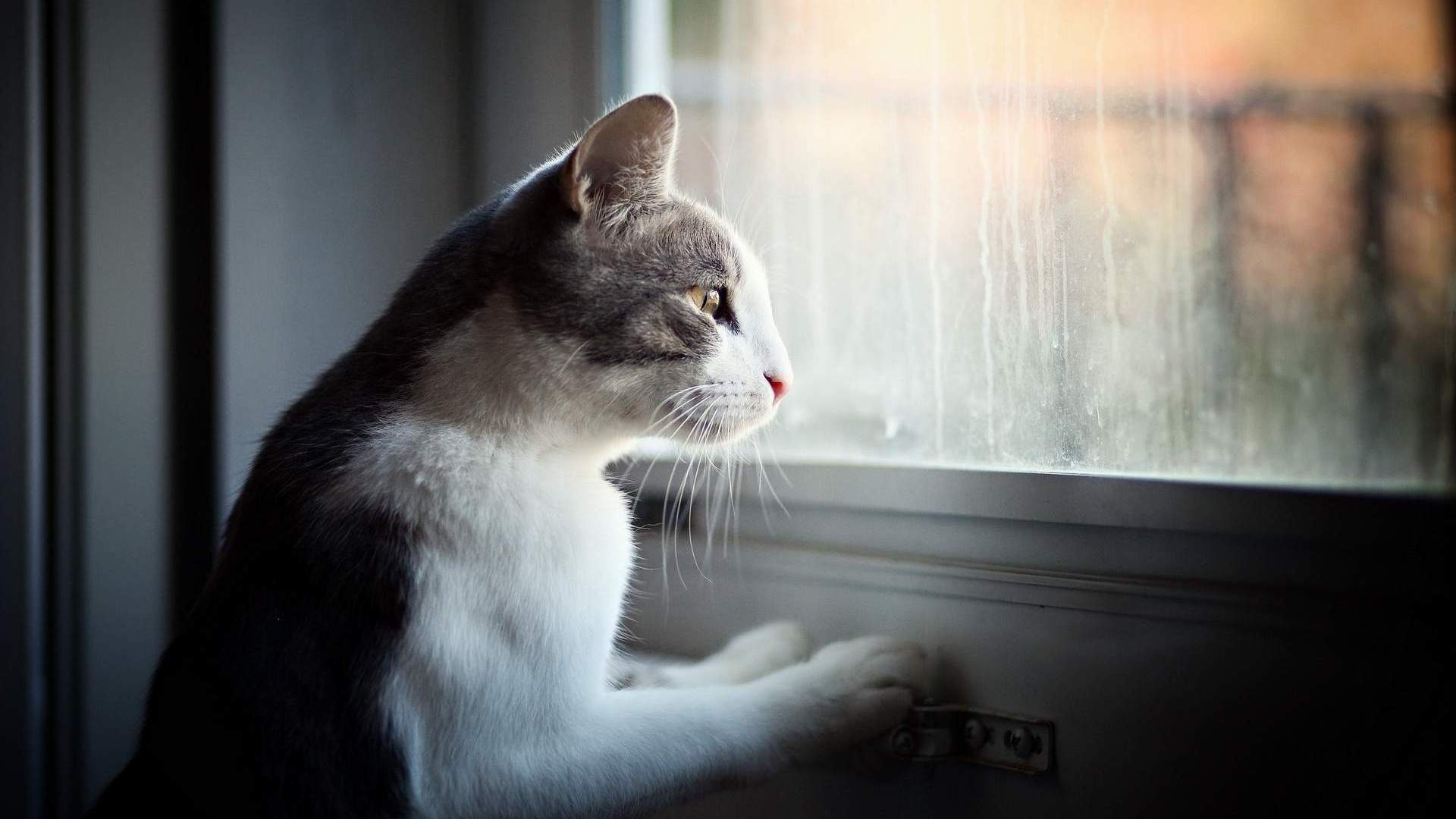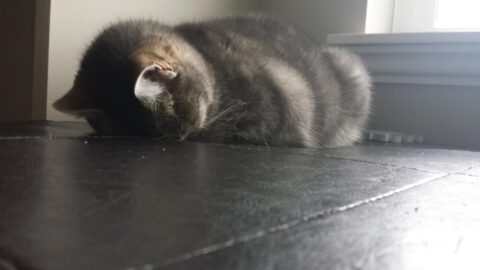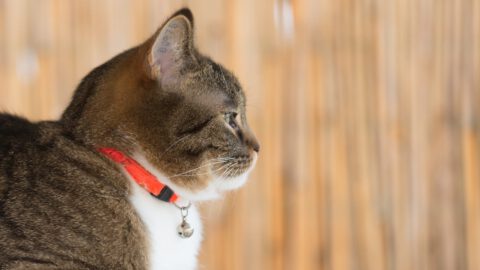Last Updated on March 22, 2020
Over 40 million people in the United States alone suffer from some form of anxiety (including myself) that can not only make a person’s lifestyle greatly change, but have one living in fear of the what if’s. While many years have been spent on studies proving dogs can suffer from GAD, separation anxiety, OCD, and panic attacks – little has been done for cats. Many assume because cats are not pack animals, they can’t suffer from separation anxiety. This is not true. Do you have a cat who you think may suffer from separation anxiety?
Warning Signs
While separation anxiety is not deadly, nor is general anxiety, it can be hard for your kitty to cope with day to day life. Things like using the litter box, eating, drinking, and playing become secondary when they are under anxiety. If you know someone who has some form of anxiety problem, take what you know about them and apply it to your cat for better understanding.
Here are some signs your cat may have separation anxiety:
You will notice your cat will cry and pace from room to room while you are (or rather, were) sleeping. This is because they are frightened that you have gone missing. You would be surprised to know that some cats will wake up from sleeping and think no one is home at night because it is quiet. Encouraging your cat to sleep in the same room as you at night will help.
Senior cats cry more
As cats get older their cognitive functions can decline enough to be considered dementia. If your cat is older, it is worth reading Feline Dementia and considering this as a possible cause.
This is not only a sign of separation anxiety but also depression. If your cat is fixed, it is important not to ignore this. This isn’t general marking but scattered spraying over certain items like towels, blankets, shoes, etc. They aren’t looking to keep other cats away but actually to attract you back. This is why peeing on your items is the most obvious target for them. You may also notice diarrhea which is from your kitty tensing and getting worked up. All humans with anxiety have some form of digestive distress.
Whether you live in an apartment building or a home that has the windows open, if your neighbor is complaining about hearing your cat cry when you are not home, it is almost guaranteed that your cat has separation anxiety. The crying will typically start low and peaceful like they are just calling for you to come over. Over time they will begin to panic and get louder and deeper. They will cry anywhere from 20 minutes to the whole time you are gone. Typically, they stop after an hour and sleep from exhaustion just like people do after a panic attack.
Yet another sign of feline depression, this one is a bit strange. While it can be happening from separation anxiety, it can also be happening from depression, OCD, a skin infection, bugs, and beyond. With separation anxiety, however, this isn’t as bad as it sounds. They will pull hair out only when they are really scared, or really relieved. It won’t be much but it will be enough to find clumps on the floor. You shouldn’t notice balding areas and it shouldn’t be excessive. If you do, and it is, it can be depression or worse so it is best to speak to your vet about it.
Dogs are known for running to the door and waiting for us to come in. Cats, on the other hand, are not known to do this as normal behavior or common behavior.
Passive greetings at the door are fine but if your cat is running at you like Dino from the Flintstones, consider this a warning sign of a cat who may have separation anxiety.
Us cat owners joke about this, but when it comes to a cat with separation anxiety, this is no laughing matter. If your cat has to be by you 24/7 while you are home, this includes coming in the bathroom with you, then your kitty may be worried you will be leaving. You will notice they are most happy and content when you are sitting still as well. They will show signs of worry or depression when they can’t sit with you.
Here is an example of separation anxiety caught on video:
What You Can Do
I never advise putting a human nor any animal on depression or anxiety medication. Anxiety is caused by a natural response in the body from stress and to suppress this will only put more stress on the body. Take it from someone who has GAD and panic attacks, it is not the answer. Here are some things you can do to help calm your kitty:
- Stay Calm – When you are stressed out, your cat will become more stressed out. If you are mad or need to raise your voice, do it away from your cat. Go outside to yell or have a room where you can shut the door and vent where your cat cannot hear you.
- Leave Something Behind – When you are about to leave for work, leave what you slept in nearby your cat so they can smell you. If they have a bed, leave it on the bed.
- Reassure Them – Keys, purses, jackets, this all means you are leaving. They know this, just as dogs do. Keep these items out of sight. If you can, keep them in the garage.
- Bring Them Back Something – This may sound like it is going to only enable the problem, but trust me, it will ease the stress. Keep a bag of their favorite treats in the car and when you come home, give them some.
- Use Lavender – I love lavender oil. Why? It naturally calms the nervous system. Buy natural-based cleaning products that are scented lavender. Also get candles and room sprays as well. Never use this stuff close to your cat or light candles while you are not home. Not only will it calm your kitty but it will repel bugs and fleas from your home.
- Don’t Use Catnip – Never leave this with them when you plan on leaving. Only use catnip when you will be home for at least 4 hours after. Catnip is a stimulant, so giving them this when you are not home will make them panic more.
- Play Music/Sounds – Playing something like birds chirping, or calming piano music will help them relax. Don’t play it super loud, just enough to where you can hear it over other noises in the home. Wind chimes seem to be well-liked by most cats.
- Comfort Them – Make sure you have time set aside each day to show them you are there to ease their tension and stress. If they want to sleep with you, let them. I can tell you from my experience, sleeping alone is the worst with anxiety.
- Find a Friend – If you only have one cat, consider getting a second if you can afford it. This will drop stress by a lot for your cat. Cats who have separation anxiety fear being alone or forgotten so having a second cat will remind them they are not alone. The other cat will also play with them to ease the stress.
- Toys – Make sure you have lots of toys, a cat tree, a window they can access, and a place they can hide. This will all help distract them from their own fears.
While separation anxiety is not as common in cats as it is on dogs, it is still a reality for some cat owners out there. Some breeds are more prone to this kind of anxiety as well. Ensuring their stress levels stay down will keep them from doing more destructive behavior to get your attention and get you to stay home.





Is Cornish Rex one of cat breeds which most likely to suffering from sepearation anxiety?
Thanks for your comment, Jack. Given that the Cornish Rex breed typically prefers their owner close by and tends to become bonded easily to them, I would say the chances of separation anxiety are higher in that breed as compared to others.
Such a timely article! I found my cat gets separation anxiety after my five-days-errands. I checked on the video records from the pet camera every day when I was out of home, and I found that he meowed loudly around the house and scratched the door of my bedroom since the second day, although I had hired a cat sitter to take care of him once two days and prepared auto-feeder and water dispenser. Now I want to find some creative ways to reduce his anxiety. The treatments mentioned above are very practice. He loves the catnip and I am going to placing some catnip and treats into different toys, so it can arouse his curiosity and consume lots of energy, which can temporarily forget my absence and reduce separation anxiety when I go for my full-day work. I’d love to adopt another cat as well because people said two cats can stay at home alone longer than a lonely cat. At last, I hope our cat parents should realize that how long a cat can be left alone before planning for your trip (over 1 day).